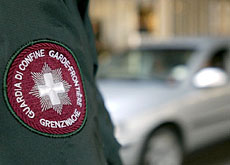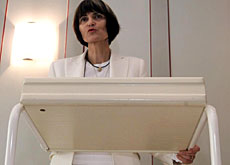EU enlargement stokes fears of wage dumping

Switzerland will not have to fully open its labour market to the European Union’s ten new member states for at least seven years, after the EU expands on May 1.
But both Left and Right in Switzerland fear that an influx of cheap labour from central and eastern Europe will deprive Swiss workers of jobs.
Swiss and EU officials met in Brussels on Wednesday to iron out remaining differences for opening Switzerland’s labour market. But both sides failed to agree a start date for the transition period.
Switzerland, which is not an EU member, already has an agreement with the 15 existing EU members allowing for the free movement of workers.
The accord has gradually opened up the labour market, making it easier for the Swiss to live and work in EU countries and their EU counterparts to live and work in Switzerland.
Opponents of extending the agreement to the ten new member states argue it would result in an influx of central and eastern Europeans looking for work in Switzerland.
Xenophobic
The rightwing Swiss People’s Party is leading efforts to prevent the accord from being extended to the new EU members. But according to René Schwok, professor of European politics at Geneva University, the party’s arguments are xenophobic and irrational.
“They are simply being xenophobic by saying they don’t want, what they call, an invasion of people coming from central and eastern European countries,” he told swissinfo.
“It’s mostly an irrational fear that hundreds of thousands of Poles, for example, will suddenly settle in Switzerland.
Opposition to extending the accord has also come from the Left and the trade unions, in particular. Schwok says these are based on fears of wage dumping and have some justification.
“Unlike in most European countries there is no minimum wage in Switzerland,” he said. “Agreements or so-called collective conventions only exist by in some professions.
“The trade unions are demanding a guarantee from the government that there won’t be wage dumping and that collective conventions will be extended to more professions.”
Mass migration
Switzerland is not the only European country worried about opening up the labour market to the EU’s ten new members.
Of the 15 existing members, 14 have introduced transitional measures to restrict the flow of workers – in particular from central and eastern Europe.
Those measures are expected to remain in place for two years.
But Diana Wallis, a British member of the European parliament, thinks fears of mass migration to Switzerland, or any other part of Europe, are groundless.
“There is nothing that suggests that there’s about to be a large swathe of immigration to Switzerland or any of the existing EU members,” she told swissinfo.
“All the proper and careful analysis seems to indicate that this is really unfounded and previous experience of enlargement shows that people prefer to stay at home as economic conditions improve.”
Transition
Switzerland has negotiated a seven-year transition period, but there has yet to be an agreement as to whether that begins at the time of enlargement – on May 1 – or later.
Brussels wants it to start from the beginning of May, but Bern argues that it needs more time to organise the transition.
There has also been no final decision on what checks and quotas will be put in place during those seven years.
Even after the transition period has finished, there is no guarantee that Switzerland will be in a position to open up its labour market completely to the ten new EU members.
With just 50,000 signatures needed to force a referendum, opponents – and in particular the People’s Party – could take the issue to the ballot box.
But Schwok believes seven years should be long enough to enable the public to reach an informed opinion.
“If people see there has been no ‘invasion’, I think any irrational fears there might be at the moment will be transformed into a much more realistic assessment of the situation,” he said.
swissinfo, Jonathan Summerton
On May 1 the EU will increase from 15 to 25 members.
An agreement between Switzerland and the 15 existing members of the EU on the free movement of people came into force on June 1, 2002.
As of June 1, 2004, Swiss nationals will no longer have preference over EU citizens from those countries on the Swiss job market.
Switzerland has obtained a seven-year transition period before opening its labour market to the ten new EU member states.

In compliance with the JTI standards
More: SWI swissinfo.ch certified by the Journalism Trust Initiative










You can find an overview of ongoing debates with our journalists here . Please join us!
If you want to start a conversation about a topic raised in this article or want to report factual errors, email us at english@swissinfo.ch.